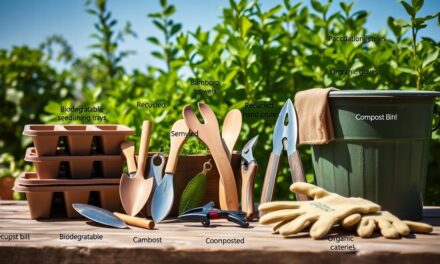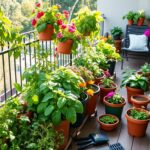Choosing the right fertilizer for your garden can feel overwhelming. I understand how tough it can be to watch your garden struggle, hoping it will bloom more each day. Through my journey of trial and error, I discovered that organic fertilizers work wonders for creating healthy soil and vibrant plants.
In this blog, I’m excited to share the top organic fertilizer reviews and some handy tips to help your garden flourish. Let’s dive in together!
Key Takeaways
- Organic fertilizers come from natural sources. They help plants grow by improving soil health and promoting beneficial microbes in the soil.
- There are many organic fertilizers, such as Dr. Earth Organic 5 and Espoma Garden-Tone. Each contains different nutrients for different plant needs.
- Organic fertilizers are better than synthetic ones because they don’t harm the soil over time. They might cost more, but they’re worth it for a healthy garden.
- To choose the right organic fertilizer, consider your plants’ needs and check the NPK ratios on the labels.
- Applying organic fertilizers correctly involves spreading granules, using spikes near roots, or mixing liquid forms with water. Adding compost can make them work even better.
Why Choose Organic Fertilizers for Your Garden?
Organic fertilizers are great for your garden. They help the soil stay healthy and strong.
Definition and benefits of organic fertilizers
Organic fertilizers come from natural sources. They help improve soil health and boost plant growth by promoting the activity of beneficial microbes in the soil. This process aids in nutrient cycling, making nutrients more available to plants.
Using organic fertilizers offers long-term benefits for my garden. They increase minerals and other nutrients, leading to rich soil. Plants thrive season after season with these natural products.
Even though they may cost more than synthetic options, their positive impact on soil health is worth it.
Comparison with synthetic fertilizers
Organic fertilizers and synthetic fertilizers differ in many ways. Synthetic fertilizers provide quick results and deliver nutrients quickly, but they may harm the soil over time. I have seen how these chemicals can damage beneficial microbes that help my garden thrive.
On the other hand, organic fertilizers improve soil health in the long term. They enhance soil structure and promote the growth of beneficial microorganisms. These natural options feed my plants while nurturing the earth beneath them.
Although the cost is higher, the benefits of a thriving garden with rich, healthy soil are worth it.
Top 10 Organic Fertilizer Products for Home Gardens
I found some excellent organic fertilizers for home gardens. Each has unique features that can help your plants grow strong and healthy.
Dr. Earth Organic 5 Tomato, Vegetable & Herb Fertilizer
Dr. Earth Organic 5 Tomato, Vegetable & Herb Fertilizer is great for my garden. It boosts soil health and gives plants the nutrients they need to grow well. This organic fertilizer contains essential elements like Nitrogen, Phosphorus, and Potassium.
These are key for robust growth in tomatoes, vegetables, and herbs.
This fertilizer also helps improve soil structure,. Beneficial microorganisms thrive in it, and over time, it enhances my plants’ productivity without harming the environment.
With Dr. Earth’s product, I feel confident about choosing natural fertilizers that support a thriving garden!
Espoma Organic Garden-Tone
I find Espoma Organic Garden-Tone to be an excellent choice for my garden. This fertilizer is made with natural ingredients. It supports healthy plant growth and rich soil health. Using it helps promote the development of beneficial microbes in the soil.
This organic fertilizer is well-suited for many plants, including vegetables and flowers. Its balanced NPK ratio provides essential nutrients that plants need, and it enhances overall soil structure.
I appreciate how Garden-Tone can give my garden lasting benefits over time while improving productivity season after season.
Jobe’s Organics Vegetable & Tomato Fertilizer Spikes
Moving on from Espoma Organic Garden-Tone, I want to share my thoughts on Jobe’s Organics Vegetable & Tomato Fertilizer Spikes. These spikes are easy to use and effective for growing vegetables and tomatoes in my garden.
They contain essential nutrients like Nitrogen (N), Phosphorus (P), and Potassium (K). This balance helps the plants grow strong.
I appreciate how these spikes improve soil health over time. They promote beneficial microbes that make the soil better for plants. Using this fertilizer has given me a thriving garden season after season.
Homemade fertilizers can also boost growth, but these spikes are a great option for convenience and effectiveness. They clearly help keep my vegetable patch healthy and productive!
Miracle-Gro Performance Organics All Purpose Plant Nutrition Granules
Miracle-Gro Performance Organics All Purpose Plant Nutrition Granules are great for many types of plants. I find that these granules help improve soil health. They contain three key nutrients: Nitrogen (N), Phosphorus (P), and Potassium (K).
This mix boosts plant growth season after season. I have noticed that my flowers and vegetables thrive when I use it.
This fertilizer also promotes the activity of beneficial microorganisms in the soil. Using it can lead to healthier plants overall. It’s handy for anyone looking for organic gardening or natural garden fertilizers.
After applying it, I noticed a big difference in my garden’s vitality. Next, let’s explore how to choose the right organic fertilizer for your needs.
FoxFarm Ocean Forest Potting Soil
FoxFarm Ocean Forest Potting Soil is an excellent choice for my plants. This organic mix contains top-quality ingredients, including earthworm castings, sea-going fish, and crab meal.
These help boost soil health while supporting the growth of beneficial microbes.
Using this potting soil can improve drainage and aeration in my pots. The nutrients it provides support strong plant growth over time. I find that my indoor plants thrive with this organic option.
Its rich texture makes it perfect for urban gardening, flower beds, and fruit trees.
Jobe’s Organics All-Purpose Fertilizer
Jobe’s Organics All-Purpose Fertilizer is a great choice for any garden. It works well for many types of plants, from flowers to vegetables. This fertilizer helps improve soil health and promotes the activity of beneficial microorganisms.
I like that it contains all three essential elements: nitrogen (N), Phosphorus (P), and Potassium (K). These nutrients are vital for plant growth, and using this organic fertilizer can lead to a thriving garden season after season.
It may cost more than synthetic options, but the long-term benefits make it worth it in my experience.
Espoma Organic Indoor Liquid Plant Food
Next, I want to discuss Espoma Organic Indoor Liquid Plant Food. This liquid fertilizer is great for my houseplants, helping them grow strong and healthy. Made from natural ingredients, it feeds microbes in the soil, improving soil health.
The nutrients in this product boost plant growth by aiding nutrient absorption.
Each bottle contains essential elements like Nitrogen (N), Phosphorus (P), and Potassium (K), which support overall plant health. Using organic fertilizers like this one can keep plants thriving season after season.
After using it regularly, I have seen positive results with my indoor plants. It truly enhances their beauty and vitality while supporting sustainable gardening practices.
Down to Earth All Natural Acid Mix Fertilizer
Espoma Organic Indoor Liquid Plant Food helps plants thrive. I often look for options that cater to specific needs. Down to Earth, All Natural Acid Mix Fertilizer is one such product.
This fertilizer works well with acid-loving plants, like roses and blueberries.
I’ve seen how it boosts healthy growth and improves soil health over time. It increases beneficial microbes in the soil, making nutrients more available. The NPK ratio in this formula supports strong roots and vibrant blooms.
Organic fertilizers like this can lead to a thriving garden season after season.
Espoma Organic Holly-Tone
Holly-Tone is an excellent organic fertilizer I use for my garden. It helps acid-loving plants like azaleas and rhododendrons thrive. This formula contains natural ingredients that improve soil health by boosting beneficial microbes.
These microbes help with nutrient cycling, which keeps plants strong.
Using Holly-Tone has shown me the benefits of organic plant food. The NPK ratio in this fertilizer supports healthy growth season after season. Thanks to this eco-friendly option, I enjoy seeing my plants grow lush and vibrant.
With Holly-Tone, gardening feels rewarding while promoting improved soil health.
Jobe’s Organics Rose & Flower Fertilizer Spikes
Jobe’s Organics Rose & Flower Fertilizer Spikes stand out for my garden. These spikes provide essential nutrients to roses and flowering plants. Each spike contains nitrogen, phosphorus, and potassium (NPK), which help plants thrive.
I’ve noticed that my flowers bloom brighter and last longer with this fertilizer.
Using these spikes is easy. Just push them into the soil around the base of each plant. They release nutrients slowly over time, feeding the plants naturally. Since using Jobe’s Organics, my garden’s health has improved dramatically.
Organic fertilizers like this one enhance soil structure and support beneficial microbes in the ground. This product truly promotes healthy growth for beautiful blooms in any garden setting.
How to Choose the Right Organic Fertilizer for Your Garden
To choose the right organic fertilizer for my garden, I must consider what my plants want. I also need to check NPK ratios, which helps me pick a fertilizer that matches their needs.
For more details on how I make this choice, keep reading!
Factors to consider
Choosing the right organic fertilizer for my garden requires careful thought. I consider what plants I have and their needs. Fertilizers contain three key elements: Nitrogen (N), Phosphorus (P), and Potassium (K).
These nutrients help my plants grow strong.
Soil health matters, too. Organic fertilizers promote beneficial microbes, which improve soil quality over time. This boost in soil health helps my garden thrive season after season.
Cost is another factor. While organic fertilizers are pricier than synthetic ones, they offer lasting benefits for soil and plants.
Understanding NPK ratios
Organic fertilizers contain three key elements for plant growth: Nitrogen (N), Phosphorus (P), and Potassium (K). These elements are vital for healthy plants. The NPK ratio shows the amounts of these nutrients in a fertilizer.
For example, a fertilizer with an NPK ratio of 5-10-5 has more Phosphorus than Nitrogen or Potassium.
Matching the proper NPK ratio to your plants’ needs is essential. Different plants require different nutrient levels to thrive. Knowing this helps me select the best products for my garden.
Using organic fertilizers can improve soil health and help plants grow strong and productive. Next, I’ll discuss choosing the right organic fertilizer for my garden.
Matching fertilizer to plant needs
Matching fertilizer to plant needs is crucial for a thriving garden. Plants need three key nutrients: Nitrogen (N), Phosphorus (P), and Potassium (K). These nutrients help plants grow strong and healthy.
To make the best choice, I focus on the NPK ratios found on fertilizer packages. For example, leafy greens like lettuce enjoy higher nitrogen levels, while flowering plants prefer fertilizers with more phosphorus.
Homemade organic fertilizers can also meet specific plant needs. They are easy to create using compost or manure. Mixing kitchen scraps into soil boosts nutrient content naturally.
This also adds beneficial microbes, which improve soil health over time. Choosing the right fertilizer supports my plants’ growth season after season.
Tips for Using Organic Fertilizers Effectively
Using organic fertilizers can be easy and rewarding. Apply them correctly for the best results in your garden.
Proper application methods
I apply organic fertilizers in a few simple ways. First, I spread granules evenly around the plants, helping them absorb nutrients. Then, I insert spikes into the soil near the plants’ roots.
Watering afterward will help activate these fertilizers.
Liquid fertilizers work best when diluted in water. I usually mix according to package instructions before spraying it on leaves or pouring it at the base of plants. Timing is also key; applying it early in the morning or late in the afternoon prevents burns from sunlight.
Opt for compost and manure as excellent supplements; they boost soil health over time, just like organic fertilizers do!
Frequency of application
Organic fertilizers need regular application for best results. I apply them every few weeks during the growing season. This helps plants get the nutrients they need. Most organic fertilizers work slowly, so frequent use is key to a thriving garden.
Compost can also boost results when mixed with organic fertilizers. It improves soil health by adding beneficial microbes. Homemade liquid fertilizer is another option for potted plants and vegetables.
These methods create a healthy environment for growth and productivity in my garden.
Supplementing with compost
I find that supplementing with compost boosts garden health. Compost adds essential nutrients to the soil. It also helps improve soil structure. This creates a better environment for plant roots.
Using organic fertilizers alongside compost works wonders. I’ve seen my plants grow stronger and healthier season after season. Soil rich in compost promotes beneficial microbes.
These tiny helpers break down materials, cycling nutrients back into the earth.
Homemade fertilizer recipes can be fun to try, too! Mixing kitchen scraps or yard waste makes excellent compost for potted plants and vegetables. My flowers have flourished since I started using organic fertilizers and compost, making my gardening experience even more rewarding.
Conclusion
Organic fertilizers can make a big difference in my garden. They boost soil health and help plants grow strong. Choosing the right fertilizer takes some thought, but it pays off. The following tips for use will keep my garden thriving all season long.
I can enjoy a healthy and beautiful space in my yard with the right care.
Frequently Ask Questions (FAQ)
What is the “Ultimate Guide: Organic Fertilizer Reviews for a Thriving Garden” about?
This guide provides information on selecting organic fertilizers for gardens and lawns, including NPK fertilizer and other alternatives.
How can I select the right fertilizers for my plants?
The guide offers gardening tips to help you choose the best organic fertilizers suitable for different types of plants based on their needs.
Are any best practices recommended in this guide when using organic fertilizers?
It includes best practices like composting as part of eco-friendly gardening and using homemade organic fertilizer recipes effectively.
Does this guide offer options for people living in cities or urban areas?
Indeed! The Urban Gardener’s section within the guide gives advice tailored to city-dwellers looking to practice organic farming.
Following this guide, Can I make my own fertilizer with ingredients available at home?
Absolutely! This guide also includes a homemade organic fertilizer recipe, which allows you to create a compelling, eco-friendly alternative at home.
















